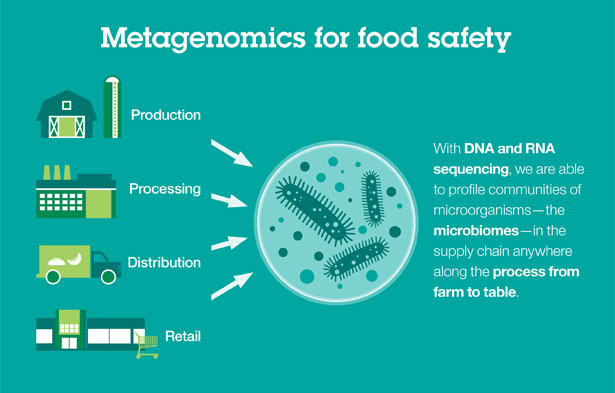 Mars Inc. and IBM Research have teamed up for an ambitious food safety whole-genome sequencing project. The Consortium for Sequencing the Food Supply Chain will study the the microbial ecology of foods and their processing environments. Having a much deeper understanding of the populations in these ecologies — bacteria, fungi, viruses, and other microorganisms — and how they interact with each other can then be used to develop new methods for keeping food safe, said Dave Crean, Mars’ global head for research and development. The science itself is similar to what the U.S. Centers for Disease Control and Prevention is using to improve foodborne illness outbreak investigations. The difference is that instead of just sequencing the pathogen isolates from patients and the food that sickened them, Mars and IBM will be sequencing the DNA and RNA for all of the microorganisms on and in foods. “We’re looking to understand how supply chains and production environments influence the final product from a microbial point of view,” Crean told Food Safety News. “Can we see microbial ecologies that give a greater risk of pathogens being present?” Food companies spend a lot of time on microbial testing to ensure that there aren’t pathogens in their products, but this consortium wants to know if there are protective actions food producers can take in respect to microbiomes that can reduce risk and make production safer — certain cleaning procedures are one theory. With more than 130 factories worldwide, Mars is also in the position to map the flow of microorganisms into and through the supply chain on a global level, Crean said. The team will start with basic commodities, such as wheat and soy, and try to see if there is a “stable” microbiology associated with them as raw materials. The researchers will also sequence the genes of the microorganisms as the foods move through a production process to find out how the microbiome is affected by different production processes, if at all. “Are microbiomes more specific to the raw material, or to the specific factories that they’re passing through, or the geography that they’re coming from?” Crean wondered. The project is going to produce a lot of data — something Crean said the team recognizes as a “significant challenge.” Stressing that it’s still “very early days,” he noted that Mars and IBM are looking to partner with industry, academics, regulators and some NGOs on the project. The vast number of microbiomes and rate at which microorganisms can evolve means that sequencing everything is virtually impossible. For now, the consortium is working on an initial timeline of three years, at which point Crean said they should have “some pretty clear outcomes.” “We’ll have more of an idea about how to take it forward after that three years,” he added.
Mars Inc. and IBM Research have teamed up for an ambitious food safety whole-genome sequencing project. The Consortium for Sequencing the Food Supply Chain will study the the microbial ecology of foods and their processing environments. Having a much deeper understanding of the populations in these ecologies — bacteria, fungi, viruses, and other microorganisms — and how they interact with each other can then be used to develop new methods for keeping food safe, said Dave Crean, Mars’ global head for research and development. The science itself is similar to what the U.S. Centers for Disease Control and Prevention is using to improve foodborne illness outbreak investigations. The difference is that instead of just sequencing the pathogen isolates from patients and the food that sickened them, Mars and IBM will be sequencing the DNA and RNA for all of the microorganisms on and in foods. “We’re looking to understand how supply chains and production environments influence the final product from a microbial point of view,” Crean told Food Safety News. “Can we see microbial ecologies that give a greater risk of pathogens being present?” Food companies spend a lot of time on microbial testing to ensure that there aren’t pathogens in their products, but this consortium wants to know if there are protective actions food producers can take in respect to microbiomes that can reduce risk and make production safer — certain cleaning procedures are one theory. With more than 130 factories worldwide, Mars is also in the position to map the flow of microorganisms into and through the supply chain on a global level, Crean said. The team will start with basic commodities, such as wheat and soy, and try to see if there is a “stable” microbiology associated with them as raw materials. The researchers will also sequence the genes of the microorganisms as the foods move through a production process to find out how the microbiome is affected by different production processes, if at all. “Are microbiomes more specific to the raw material, or to the specific factories that they’re passing through, or the geography that they’re coming from?” Crean wondered. The project is going to produce a lot of data — something Crean said the team recognizes as a “significant challenge.” Stressing that it’s still “very early days,” he noted that Mars and IBM are looking to partner with industry, academics, regulators and some NGOs on the project. The vast number of microbiomes and rate at which microorganisms can evolve means that sequencing everything is virtually impossible. For now, the consortium is working on an initial timeline of three years, at which point Crean said they should have “some pretty clear outcomes.” “We’ll have more of an idea about how to take it forward after that three years,” he added.
Sponsored by Marler Clark
